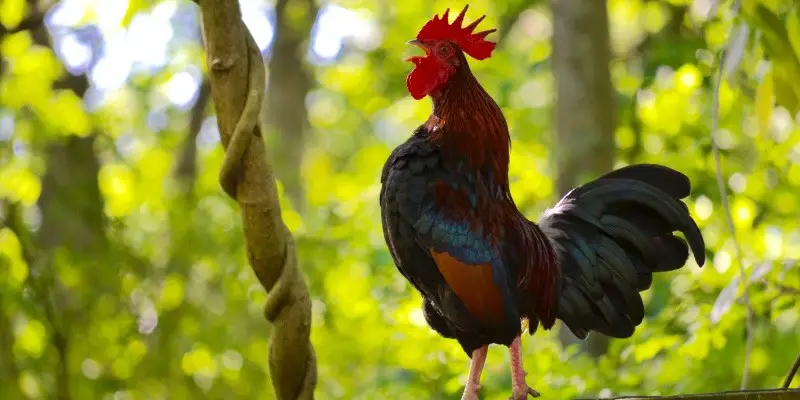Roosters are loud backyard animals capable of crowing all day! Many neighborhoods have regulations against keeping roosters because of the constant noise. What if there were a way to keep your roosters from crowing? The possibility sounds excellent.
This article will explore why roosters crow and how to stop them from crowing all day. Let’s get down to it, shall we?
Why Do Roosters Crow All Day?
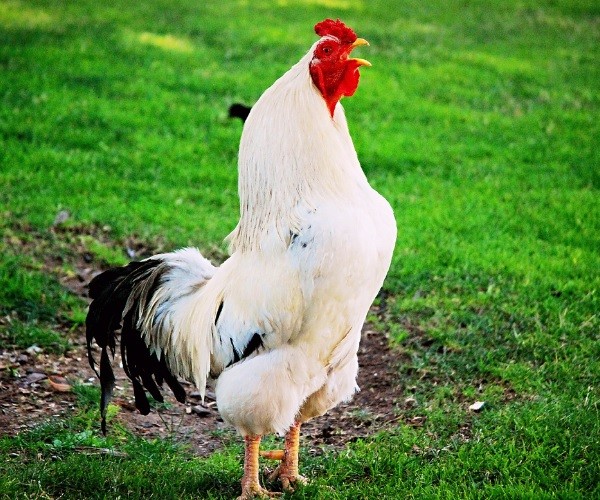
Roosters crow all day for many reasons. First on the list is that they crow to express themselves and their moods; roosters crow when they are happy, scared, angry, hungry, etc. Usually, the rooster cries early in the morning to signify dawn; the same crow could also be a warning mechanism for other fowls.
Other reasons why your rooster crows non-stop include:
- Territory marking
- Mating ritual
- Establishing a pecking order
- Insufficient hens in the coop
- Internal body mechanism
- Unmet needs
- Predator alert, etc.
So you see, there are different reasons why your rooster crows all day, and while it can be extremely annoying, there is hope. Learn about easy ways to stop your rooster from crowing.
9 Ways to Stop Your Rooster from Crowing All Day
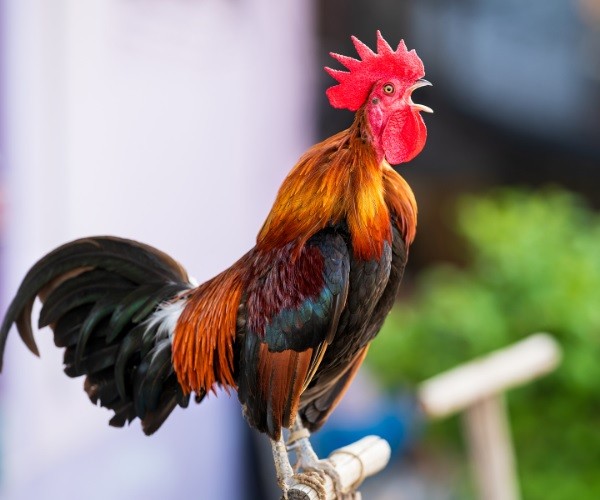
1. Explore the Reasons for the Roosters Crows
Before you take measures to get your rooster to stop crowing, it makes sense that you check out why they are being so noisy. The first is to understand that while the rooster’s crows can become irritating, the rooster is not just trying its best to annoy us.
You may find that the reason for the repeated crows is land or air predators, in which case, the crows serve as an alarm mechanism for other fowls. The next time you hear the rooster crowing repeatedly, check its environment and eliminate the threat or possible threat.
2. Try a Rooster Collar
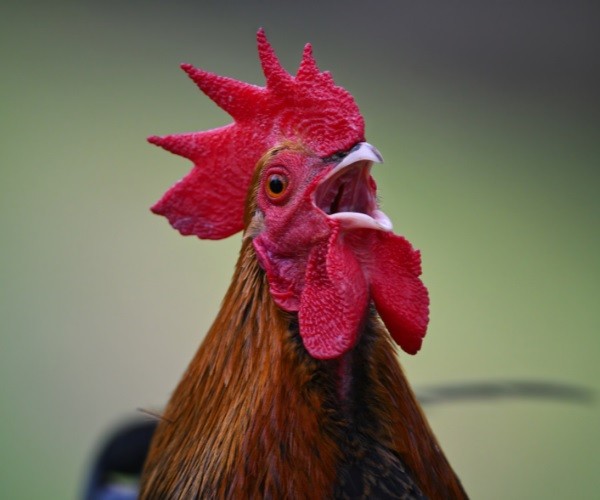
An effective way to stop rooster crowing is to use a rooster collar. The rooster collar is placed around the rooster’s neck and restricts its airflow when it attempts to crow. Thus, the collar makes it difficult for the rooster to crow at loud volumes, so instead, you get a much quieter crow.
The reduced crows may help alleviate the frustrations of your neighbors. If you can’t find a rooster collar, you can make do with a small dog collar.
3. Provide for the Rooster
Roosters are like most barnyard animals; they become incredibly vocal once they are unhappy about something. Crowing is one of the ways the rooster expresses its dissatisfaction. So if your rooster is crowing non-stop, you should check that you are meeting its needs for food, water, and shelter.
Your rooster will become a lot quieter once it consistently has a comfortable environment to stay in, food, and clean water. So next time your rooster crows all day, check that its needs are met.
4. Add More Hens to the Coop
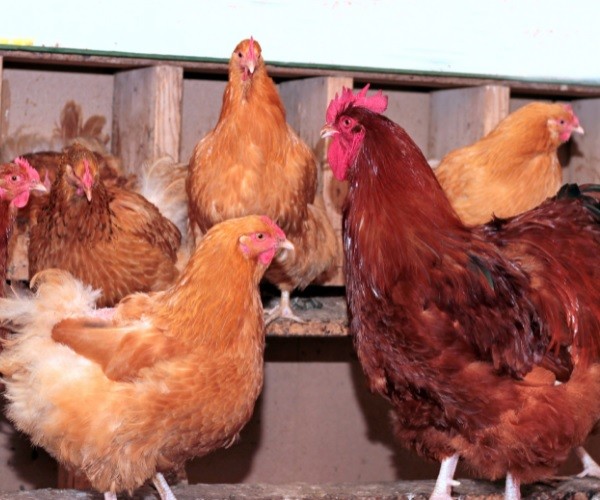
Sounds funny, but roosters may become more vocal when there are not enough hens in the coop. The more hens you have, the less your rooster will crow because the hens occupy his attention. So when setting up a coop, remember to keep more hens than roosters in it. A flock of 1:10 rooster to hen ratio is perfect.
When in doubt, add more hens. It would help if you had fewer roosters in your flock anyways.
5. Reduce the Competition
One of the common reasons why roosters crow is to show off and communicate who is in charge. We advise you to limit the number of roosters in your flock and throw in enough hens to keep them occupied. The rooster can quickly establish a pecking order when the ratio of hen to cock is 1:10.
Roosters become less noisy once the pecking other has been established because there is no longer stiff competition. If throwing in more hens to the mix doesn’t do the trick, you may need to consider reducing the number of roosters in the coop.
6. Trick the Rooster
A common practice among backyard breeders is tricking the rooster, which has proved very successful. The trick is to design the coop with artificial light to trick him into believing it is still daylight outside. That way, you can circumvent the rooster’s natural alarm system.
The rooster adjusts to the continued daylight with artificial lighting and only crows when let out of the coop. This trick can buy you some extra hours of much-needed sleep!
7. Entertain your Roosters
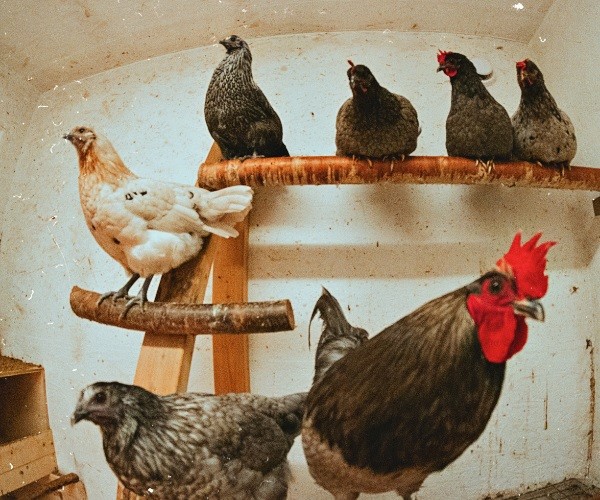
Roosters are brilliant birds that are very aware of their surroundings. They can quickly become bored and start to crow unnecessarily thanks to their high intelligence. In that case, a change of scenario should solve the problem. You can get a mobile coop to give him new areas to explore.
Another way to entertain the rooster is to add new toys to its coop, almost like a treasure hunt. Hiding food in the cage also serves as an excellent external stimulant for the rooster.
8. Occupy the Rooster with Other Activities
Being cooped up in a tiny space can be boring for animals, especially roosters, and a bored rooster is noisy and destructive. You can combat this by giving your chicken some more room to explore. Alternatively, you can engage your chicken in stimulating activities.
Another way to keep your rooster from crowing is to trick it with food. Most backyard breeders give the rooster food that occupies it for long. A prime example is a corn cob; for as long as the rooster is occupied with the cob, he will not crow.
9. Surgical Alterations
In extreme cases, people have resorted to surgical means to stop their roosters from crowing. Usually, a veterinarian is enlisted to handle the complicated surgery and is generally sets you back considerably in cash. However, this extreme measure is considered inhumane, so we do not recommend it as a first option.
Conclusion
The first step in getting your rooster to stop crowing is understanding why it is crowing. Sometimes it may be boredom, predators, or unmet needs. Once you have identified the trigger, use any of the methods and tools in this article to get the rooster to stop crowing.
Last Updated on November 1, 2023 by Pauline G. Carter

